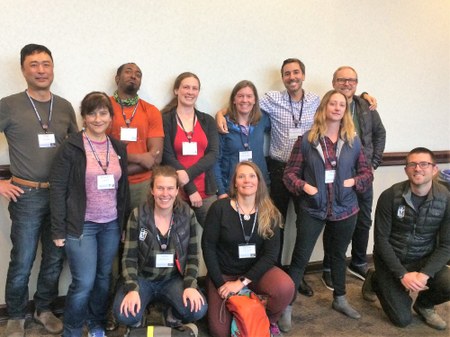
The Wilderness Risk Management Conference (WRMC) is an annual gathering of outdoor professionals that creates an unparalleled opportunity for experts from throughout the industry to share knowledge and best practices. We were lucky that this year's conference was so close to home - just down the road in Portland, OR - which allowed us the opportunity to send a group of fourteen staff and volunteers to learn and share on behalf of our organization.
As a part of this continued learning, we've compiled takeaways from a handful of the most impactful sessions.
Building a Foundation for Understanding Inclusion
In advance of the main conference, a smaller group of six Mountaineers attended a pre-conference workshop on Building a Foundation for Understanding Inclusion. This was a particularly relevant opportunity in light of The Mountaineers recent commitment to diversity, equity, and inclusion as a part of our Vision 2022 strategic planning. With the recent establishment of an Equity and Inclusion Committee, we will heed these takeaways as we approach this work:
- We need to think about systems of oppression and how they are manifested at three levels: individual, institutional, social/cultural.
- We need to be aware of how the media portrays the outdoor industry and culture, and we need to work try to expand our awareness. For example, following #diversifyoutdoors on Instagram is a great way to show and see the often underrepresented groups and people in the outdoor industry.
- "White Fragility", the discomfort or defensiveness on the part of a white person when confronted by information about racial inequality and injustice, is something that everyone needs to understand. The antidote? Ongoing (and often painful), lifelong sustained engagement, humility, and education.
Training to Failure and Other Unlikely and Highly Effective Training Strategies
Make learning hard! We remember the most challenging experiences in life, not the easy ones. That said ... do not train where you wouldn’t go, well outside of your experience or program parameters! Find conditions that boarder the "no go" line to provide a realistic learning experience about pushing the boundaries of "normal" and reiterating our limits. Testing ourselves is the best way to calibrate judgement.
- It doesn’t make sense to spend time training in “normal” conditions in order to prepare for “non-normal” situations/events.
- Educating with “safe failures” is more effective than trying to create “fail-safe operations” in training.
- Safe Failure: I know what it feels like and I know why I don’t do it that way...
- Fail-Safe Operations: I don’t really know why, but we don’t do it that way...
Example: New climbers are taught to belay their partner while he/she is climbing. The climbing isn't difficult, and whole sessions go by without a climber taking a fall. Belaying during successful climbing does not save lives; catching a fall while belaying saves lives. Therefore, consider setting-up a redundant system to teach belayers to catch falls (over and over) from Day 1, and as they become competent, remove the redundancy and train them to catch falls from different heights, directions, etc.
Cultivating Outdoor Leadership Through Storytelling
Storytelling is a powerful way to build trust and community. When a leader displays vulnerability (as opposed to presenting themselves as superman/superwoman), it allows participants to bring forward small concerns such as interpersonal conflict or hot spots.
- Crafting and sharing stories of connection fosters a more cohesive community.
- Adding "coherence" to your story creates resonance and connections.
- Challenge - What did you struggle with?
- Supports - Who supported you and how?
- Choices - What leadership or action did you take?
- Outcomes - What was the result?
- Values - What do you appreciate or value as a result?
- Sharing resonance and connections - "I was right there with you when ..." - after storytelling amplifies the trust and community between groups of people. When sharing your resonance or connection with another person's story, DON'T: Interpret, Tell Your Own Story, Ask Questions, Share Opinions, One-Up, One-Down.
Crisis Management: A Preplan in Action
Build a response protocol and have a solid plan in place. This will free mental capacity to make good choices in the moment when something happens. The more you can pre-plan, the more you can focus on what matters when it really matters.
Developing Good Judgement and Decision Making
During role playing/training, trainers should maintain the complexity of scenarios. It is okay to make scenarios “simple”, but don’t make them simplistic. Leader need to be flexible and adaptable with a core set of skills.
Thank you!
Thank you to the staff and volunteers who dedicated their time to attending this conference and sharing their takeaways back to our community!
- Andre Gougisha
- Stacey Lissit
- Danielle Graham
- Paul Thomsen
- Grier Phillips
- Rebecca Catlin
- Katja Hurt
- Tony Tsuboi
- Matthew Palubinskas
- Garrett Arnold
- Bill Ashby
- Nick Block
- Becca Polglase
- Sara Ramsay
Interested to attend a future WRMC?
Next year's WRMC is scheduled for October 30 - November 1, 2019, in Albuquerque, New Mexico. Please keep an eye out for scholarship opportunities to attend on behalf of The Mountaineers in Summer 2019!
 The Mountaineers
The Mountaineers